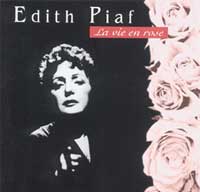 I was completely obsessed with the famous French singer Edith Piaf when I was in high school. I would spend hours and hours playing her records until I could do a passable imitation of “Non, je ne regrette rien” in front of my bedroom mirror. Although I was too young to have the regrets mentioned in her song, the drama and heartache of her delivery and her longing for love seemed to reflect my teenage angst. Piaf was the main reason I became a French major. But although she died in 1963, early in my last year of high school, I knew very little about her life. The new film “La Vie en Rose” (the title of her most famous song) has finally changed all that.
I was completely obsessed with the famous French singer Edith Piaf when I was in high school. I would spend hours and hours playing her records until I could do a passable imitation of “Non, je ne regrette rien” in front of my bedroom mirror. Although I was too young to have the regrets mentioned in her song, the drama and heartache of her delivery and her longing for love seemed to reflect my teenage angst. Piaf was the main reason I became a French major. But although she died in 1963, early in my last year of high school, I knew very little about her life. The new film “La Vie en Rose” (the title of her most famous song) has finally changed all that.
Piaf’s life was anything but rose-colored. This tiny woman with the huge voice, whose stage name, Piaf, means sparrow, was born to itinerant street performers in a wretched environment of alcohol, drugs, poverty, and abuse. (If the film is accurate, her grandmother was the madam of a brothel, where good-hearted prostitutes gave Edith the only mothering she ever knew).
I won’t spoil the film for you, but even after her gift was discovered on a Paris street corner, her life consisted of one tragedy after another, grist for the mill of that incredible voice. (Gilda Radner’s saying comes to mind: “It’s always something.”) Piaf became the most beloved singer in France–appearing on the Ed Sullivan Show; she was the emblematic voice of France in the U.S. and around the world.
To the end of her life she dressed in simple black with a cross at her neck. The film portrays a woman of childlike tantrums and childlike faith, who prayed to St. Therese of Lisieux and heard voices, like fellow visionary Joan of Arc. The film is wonderful, with Marion Cotillard inhabiting the role of Piaf. Go see it. Meanwhile, thanks to the miracle of YouTube, you can see and hear Piaf herself performing her immortal songs.
—Wendy Schuman
More from Beliefnet and our partners


